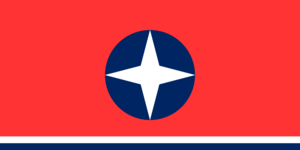User:Kir/Draftspace11
CDI
| Caucus of Democrats & Independents Kadastra Thāruāritarisēskya us Vìutikulya | |
| File:Kashiyatra-logo.png Logo | |
| Headquarters | №21, 18-ram, E-District, Kartika |
| Caucus Chair | Ávkusta Tólyatin Śinesékin |
| Whip | Lardarius Bināryn |
| Platform | Big tent Modern liberalism Radical centrism Shaftonist democracy Neoliberalism |
| Voter Base | The Metics |
| Conferences | Union of Democrats & Independents |
| Federal Stanora | 27 / 545
|
The Caucus of Democrats and Independents is a legislative caucus in the Kiravian Stanora. Composed mainly of former members of the Shaftonist-Republican Alliance, the caucus describes itself as "a diverse and independent-minded caucus of problem-solvers", and is commonly described by the press as "the meeting of Delegates who are neither conservative nor socialist". Occidental analysts typically consider the CDI as centrist to centre-left.
In the current configuration of Kiravia's coalitional-presidentialist system, the CDI are part of the anti-administration camp, which is currently in the legislative minority.
The CDI originated as a working group and breakfast club within the SRA caucus called the Mimosa Group, made up of Delegates with a more liberal perspective on the Shaftonist-democratic political programme. A political conference, the Shaftonist Democratic Union, was organised along similar ideological lines in [YEAR], in response to a perceived "rightward" turn in the SRA/SRI and the policies of the Candrin administration. The SDU affirmed its loyalty to the SRA caucus and its member-parties continued to participate in the SRI, but the SDU only operated more and more independently over time, even changing its name to the Independent Democratic Union in [YEAR] and dropping any explicit commitments to the SRA and SRI later that year when it took on observers from outside the traditional Shaftonist-Republican column. Delegates affiliated with the IDU continued to sit with the SRA caucus and pro-administration camp, but by [YEAR] were understood to be functioning as an autonomous caucus for most purposes, as often happens in Kiravian politics. The formal break with the SRA was made after the Treaty of Electorsbourg, when the IDU-affiliated Delegates crossed over to the anti-administration camp, stating their opposition to a Kiravian neo-colonial presence in Crona and intention to vote against ratifying the treaty, and notified the Chancellor that they would thenceforth sit as the Union of Democrats and Independents.
Who is in it:
In Stanora:'
- Tea Party (Fariva) - former SRA, splintered from First Farivan Party
- Civic Institutional Party (Kiygrava) - former SRA
- Union Democratic Party/Democratic Movement Party (Æonaran states) - former RKC
- Sky Blue Party (Kaskada) - former SRA
- Scientific-Industrial Party (Xirya) - former SRA
- Moderate Party (Bissáv) - former SRA
- Independent Republican Party (Erinava) - former SRA
In State offices:
- New Democratic Party (Niyaska) - idk.
- Constructive Party (Ventarya) - former SRA
- Constitutional Democratic Party
- Citizenship Party
- Public Communities Party (Kastera, Interlaken)
- Yellow Apple Party (Vendée?)
Observers with regional office:
- Pribraltar Freedom Party (also RKC observer)
Participation trophy holders:
- Deletionist Party (Serikorda) - former LG, flipped non-inscrit after KFA merger
- Wastani People's Party - former non-inscrit
Participation trophy observers:
- Great Kirav Independence Party (also LFK observer)
- Senatorialists and Parliamentarists
Name bank: Public Choice Party Public Interest Party Public Justice Party -- Opportunity Party Fair Shot Party Inclusive Republican Party Inclusionist Party Mergist Party
LDPK
| Liberal Democratic Party Liberandix Thāruāritax Plaiduv | |
Flag | |
| States | Fariva, Kiygrava, Serikorda, Cascada |
| Headquarters | Madisar, Fariva |
| Chairperson | Marsellín Kótdivoir |
| Leader | Apollinarius Paraben |
| Platform | Progressive liberalism Social liberalism Liberal internationalism Westernisation factions: Neoliberalism Social democracy |
| Voter Base | Cosmopolitan coastal élites |
| Conferences | Open Kiravia Conference |
| Federal Caucus | non-inscrit |
| Electoral Symbol | |
| Madisar City Council | 2 / 7
|
| Federal Stanora | 0 / 545
|
CPKF
VNQDD
| Umcaran Renaissance Party Plêduv Ùmkarag Inowamsuk | |
 Flag | |
| States | South Æonara, Liberantia, Eriada, West Æonara |
| Headquarters | Rambosar, South Æonara |
| Chairperson | X.N. Vúhoń |
| Leader | Bob Jones |
| Platform | Umcaran Coscivian interests Shaftonist republicanism Coscivian nationalism Conservatism |
| Voter Base | Umcaran Coscivians |
| Conferences | Interstate Republican Conference |
| Federal Caucus | SRA |
| Electoral Symbol | |
| South Æonara | 32 / 120
|
| Liberantia | 35 / 65
|
| Federal Stanora | 4 / 545
|
EJP
| Economic Justice Party Plaiduv Timoniúlitærēsk | |
Logo | |
| Headquarters | №21, 18-ram, E-District, Kartika |
| Party Chair | Saverius Kaîśaxon |
| Whip | Ordovicius Sūrmiran |
| Platform | Georgism Geoconservatism Social credit Distributism Monetarism Social conservatism Agrarianism |
| Voter Base | Farm Gang |
| Conferences | Progressive Alliance |
| Caucus | Kiravian Free Alliance |
| Federal Stanora | 4 / 545
|
LFK
| Labour Front of Kirav Ventaver Kiravsk | |
 Flag | |
| States | Kiorgia, Tanuvia, Knassania |
| Headquarters | Cityname, Hiterna |
| Chairman | Getulius Kalusakin |
| Whip | Raster Hirispan |
| Platform | Wittonian socialism Paternalistic conservatism Labourism Cisatrassicism |
| Voter Base | Mostly workers. |
| Conference | Kiravian Labour Parties |
| Federal Stanora | 212 / 545
|
The Labour Front of Kirav - Kiravian Labour Parties (Ventaver Kiravsk - Kiravix Ventaplaiduya) is a caucus in the Federal Stanora associated with the Kiravian Labour Parties interstate conference of political parties. The LFK caucus is organised around a platform based on solidary economics (inspired heavily by Wittonian socialism) and opposition to closer economic and political integration between the Kiravian Federacy and Atrassic Crona.
History
Origins
The history of the LFK begins with the founding of the Elegian? Labour Party in 21XXX by Mâkupa Naymir, a member of the Elegia? state legislature with the [CSU party]. Elegia at the time was struggling economically due to the post-Kirosocialist economic liberalisation, particularly areas like Naymir's own constituency in County Bunghole, which was reeling from a string of plant closures. Naymir, a committed distributist, had in his youth been an ardent activist against the Kirosocialist régime and a strong supporter of the National Renewal Movement, but also an advocate of comprehensive land reform and the cartel politics practiced by privileged ethno-social communities and aristocratic families in many parts of the country. As such, he had persisted in politics with a strong antipathy towards his colleagues from the Socialist Party of Elegia and the traditionalist-conservative Elegian Home Party. However, he found himself increasingly working across the aisle with members of these parties and against his putative allies in the SRA-aligned Rennovation party.
First Expansion
Decline after 21XYX
Naymir's death in 21XYX marked the beginning of a period of decline in the LFK as a national movement. Although some state parties remained competitive in their respective states' political scenes and new affiliates were established on the Eastern Seaboard, changing political conditions and a lack of clear leadership, vision, and direction from the interstate conference led most of the parties to adapt their platforms and local strategies independently. Most notably, the Etivéran Labour Party entered an electoral alliance with that state's SRA-affiliated parties, in a break with longstanding LFK tradition.
Post-Deluge Revival
Platform
Ideological mantle
WitSoc with Coscivian characteristics and how that works.
The LFK is socially and culturally conservative, by both international and Kiravian measures.
Crona policy
The centrepiece of the contemporary LFK platform is opposition to economic and political integration between the Kiravian Federacy and Kiravian-governed territories on mainland Crona. It rejects the various proposals put forth for an "Atrassic Union" and for the incorporation of Cronan territories into the Kiravian Federacy proper. It has pledged to maintain customs and migration controls between the Federacy and Kiravian Crona, and to enact heavy restrictions on the entry of native Cronans to the Federacy. The LFK holds that barriers to the inflow of people and goods from Crona are necessary to protect Kiravian workers and domestic industries from cheap Cronan labour.
The LFK is not opposed to Kiravian neo-colonialism in Crona in principle, and has stated that an LFK administration would honour the Federacy's military, administrative, and humanitarian commitments on the continent while working toward a more "sustainable and people-centric overseas development model that is fair to ordinary people on both sides of the ocean." (sóstenaptix us plānoimdix dhevelotorsilver rív é leftix sasnarustondya ibipeśorê iosková.) Despite this being the official party line, many people with more explicit anti-colonial sentiments have rallied to the party, and there is a pronounced minority wing in favour of scaling back the Kiravian presence in Crona.
Contemporary diversity
Since 21XYY, opposition to Trans-Atrassic integration has taken centre-stage in the LKF, becoming its top policy priority and defining campaign plank.
Popular support
The LFK's core voter base are working-class people in Second Kirav and Third Kirav, especially those employed in industry, agriculture, and resource extraction. LFK parties and candidates perform most strongly in industrial and mining areas of Central, Southwestern, and Northwestern Kirav, as well as the Western and Eastern Highlands in federal elections. They do not perform well in Farravonia, the Míhanska Bay region, or the Northeast-Northeast.
The LFK does not currently have state affiliates in overseas regions of the Kiravian Federacy. A spokeswoman for the conference stated that this is not by design and that the conference would welcome affiliates from overseas states and territories.
Green Party of Kirav
| Green Party of Kirav Glasiplaiduv Kiravsk | |
Logo | |
| Headquarters | Kernovek, Serikorda |
| Chairman | Cládiuv Luatorkár |
| Whip | Kirmuid Ranapaćukuv |
| Platform | Green liberalism Liberal democracy Progressivism Populism |
| Voter Base | Environmentalists Mainland youth Liberals Bahá'ís |
| Caucus | Third Front |
| Federal Stanora | 55 / 545
|
The Green Party of Kirav (Kiravic: Glasiplaiduv Kiravsk) was a liberal-democratic and environmentalist political party in the Kiravian Federacy between Reunification and passage of the Anti-Party Law. The Greens came to lead a Third Front between the National Renewal Movement and the People's Alliance, and exerted influence on federal policy during this formative stage of post-unification Kiravian politics. Support for the Greens suddenly imploded in [YEAR] following the controversial indictment of their leader, Cládiuv Luatorkár, on bestiality charges. Consequent power-struggle within the party apparatus and the regulatory burdens imposed by the Anti-Party Law led the party to splinter into several rival factions, none of which would approach the original party's level of success. Nonetheless, the legacy of the Greens and the Green-led Third Front lives on in some currents of the Kiravian Free Alliance and Union of Democrats and Independents.
Background
The reunified Kiravian Federacy in 1985 AD inherited significant environmental challenges incurred by the policies of its predecessor governments. A half-century of rapid and intensive industrialisation on both sides of the Sunderance had resulted in serious pollution problems and ecological degradation in the Overseas as well as Great Kirav. That said, the environmental situation on the Mainland in 1985 was unquestionably worse. Environmental degradation and the extractive policies of the Kiravian Union had devastated rural communities.
Historians of the period contend that discontent over environmental issues was a contributing factor to the widespread popular unrest that preceded the collapse of the Union.
Run
The Greens located their base of support among those Mainland voters, particularly youth, who welcomed the end of Kirosocialism and the opportunity for change, but were wary of the nation's "new management" in the form of the previously Æonara-based political class organised as the National Renewal Movement. Virtually all Kiravians outside the Kirosocialist camp rejoiced at reunification in principle; nonetheless, a significant share of Mainlanders still adhered (perhaps not without merit) to the image that Kiravian Union propaganda had painted of the "Æonara authorities": a coalition of right-wing military honchos and shadowy technocrats with a retinue of atavistic reactionaries and avaricious plutocrats in tow.
Green messaging in the early years of democracy was built around the theme of a "fresh start" (Miśnalōm) that contrasted with triumphalist NRM campaigns claiming credit for "restoring" the constitutional order and Kiravian liberties and People's Alliance campaigns focused on the imperative to protect social progress made under the Kiravian Union. To Kiravians uncomfortable with the dominant narrative of the Remnant defeating the Union and imposing its victorious ideology on Great Kirav, the Greens proclaimed that both regimes had run their course and that reunification was a moment of opportunity to leave Sunderance politics behind and build new, all-inclusive institutions to meet the challenges of a new era.
Platform
Unlike most green parties internationally, the Kiravian Greens were affirmatively capitalist and broadly liberal on economic matters.
- Abolition of conscription and general dimilitarisation
- Strengthening the legal régime of the Emperor's ownership of the commons
- Ideally, a new constitutional convention, or otherwise constitutional amendments toward the following ends:
- Equalisation of the provinces
- Levelling of citizenship
- Electoral reform: Proportional representation in the Stanora and a sane normal system for electing the PE.
- Open nominations for the Prime Executure
- Executive term limits
- Lowering the voting age to 18
- Abolition of the internal passport system
- Ban on tetraethyllead
Collapse
The party collapsed after its leader, Cládiuv Luatorkár, was indicted and ultimately convicted on charges of bestiality involving cattle and camelids. Luatorkár maintained his innocence. After his release from prison, Luatorkár found life in Kiravia to be unbearable and moved to Cartadania, where he changed his name to Claudio Espeto and died in obscurity in 2017 AD.
Surviving provincial chapters and splinter groups descended from the Green Party include:
- Civilian Ecological Party - A minor party mainly active on demilitarisation, civil liberties, and transparency issues
- Democratic Farmers' Party of Intravia
- Banana Slug Party of Ilfenóra
- Green Party of Exónia Autonomous Countyship - One of two major parties in the locality, alongside the Anti-Masonic Party
Third Front
| Third Front Kírover | |
 Logo | |
| Headquarters | Kartika, District of Coīnvra |
| Chairman | Matéuv Dénalin |
| Whip | Siné Qu'Anon |
| Platform | Liberal democracy Environmentalism Populism factions: Agrarianism Social liberalism Progressivism Georgism Social credit Green conservatism |
| Voter Base | Upper Kirav, Indebted farmers, Bahá'ís, Libs |
| Caucus | Third Front |
| Federal Stanora | 75 / 545
|
Political Dynamics of the Stanora
The political dynamics of the Stanora are shaped by X main factors:
- Coalitional presidentialism -
- Party Incohesion - A relatively weak balance of centripetal forces (e.g. party structures and financing, procedural power) against centrifugal forces (committee power, diverging interests of state parties, STV) and legal limits on the institutional power of political groups make for a rather low level of caucus and coalition cohesion relative to most other national legislatures.
MSRP
| National Constructive Organisation Xinórabávitoriskorvin | |
| File:DATCO..jpg Flag | |
| States | Nera, Kastera, Hiterna, Etivera, Váuadra, Devalōmara, Entarova, Kannur, Vitrova, Sixuan, Iunnan, Korlēdan, Kiygrava |
| Headquarters | Irastuv, Nera |
| Chairman | K.A. Serānian |
| Whip | V.M. Tāgen-Iribisuv |
| Platform | State capitalism Productivism Developmentalism Technocracy Industrialism Transatrassicism tendencies: Liberal conservatism Neo-mercantilism Kir nationalism |
| Voter Base | White-collar workers Kir people |
| Conference | none |
| Federal Stanora | 55 / 545
|
Overt agenda: Professional, pragmatist centre-right to right-wing politics. Pro-growth, pro-corporate policies. Supportive of the social order but quiet on any cultural issues.
Covert agenda: Libertarian police state/corporate police state.
Post-Kirsoc non-ideological "party of power" in its states.
See Also
| Auxibrev | |
|---|---|
| Emperor | |
| Reign | 420-469 |
| Successor | Marble Emperor |
| Children | None |
| Father | Bruxinev |
| Mother | Bruxinev's third wife |
| Born | 401 |
| Burial | at sea |